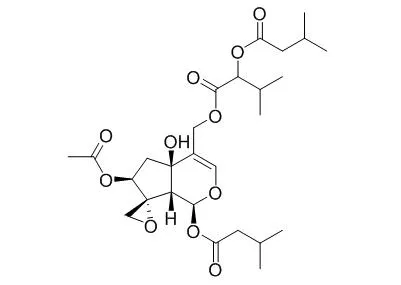Identification of novel chemotherapeutic agents from traditional medicines and elucidation of the molecular basis of their anticancer effects are critical and urgently needed for modern pharmacotherapy. We previously found that analogs of the compounds present in Valeriana jatamansi, a traditional medicine used to treat mental disorders, possess notable antitumor properties; however, the underlying molecular mechanisms have not been fully demonstrated.
METHODS AND RESULTS:
In this study, we evaluated the anticancer effects of IVHD-valtrate, one of the most active Valeriana jatamansi derivatives, against human ovarian cancer cells in vitro and in vivo. IVHD-valtrate inhibited the growth and proliferation of the A2780 and OVCAR-3 ovarian cancer cell lines in a concentration-dependent manner, while relatively low cytotoxicity to immortalized non-tumorigenic human ovarian surface epithelial cells (IOSE-144) was observed. Treatment with IVHD-valtrate arrested the ovarian cancer cells in the G2/M phase and induced apoptosis, and significantly suppressed the growth of A2780 and OVCAR3 xenograft tumors in a dose-dependent manner. The detailed in vitro and in vivo study on the molecular mechanisms of this compound demonstrated that IVHD-valtrate exposure modulated the expression of numerous molecules involved in cell cycle progression and apoptosis regardless of p53 status, leading to increase the level of p53, Rb, p21, p27 and decrease Mdm2, E2F1, Cyclin B1, Cdc25C and Cdc2. It also down-regulated Bcl-2/Bax and Bcl-2/Bad ratio and enhanced the cleavage of PARP and Caspases.
CONCLUSIONS:
Our preclinical results indicated IVHD-valtrate is a potential therapeutic agent for ovarian cancer, providing a basis for development of the compound as a novel chemotherapeutic agent. |






 Cell. 2018 Jan 11;172(1-2):249-261.e12. doi: 10.1016/j.cell.2017.12.019.IF=36.216(2019)
Cell. 2018 Jan 11;172(1-2):249-261.e12. doi: 10.1016/j.cell.2017.12.019.IF=36.216(2019) Cell Metab. 2020 Mar 3;31(3):534-548.e5. doi: 10.1016/j.cmet.2020.01.002.IF=22.415(2019)
Cell Metab. 2020 Mar 3;31(3):534-548.e5. doi: 10.1016/j.cmet.2020.01.002.IF=22.415(2019) Mol Cell. 2017 Nov 16;68(4):673-685.e6. doi: 10.1016/j.molcel.2017.10.022.IF=14.548(2019)
Mol Cell. 2017 Nov 16;68(4):673-685.e6. doi: 10.1016/j.molcel.2017.10.022.IF=14.548(2019)